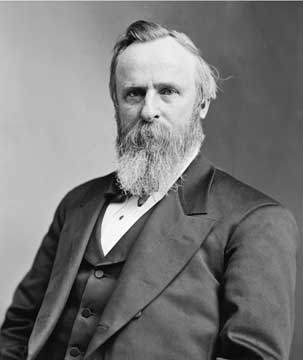Rutherford B Hayes

Hayes ended Reconstruction in the South. He recalled the troops and allowed the South to govern itself. Hayes' major accomplishment was his reform of the civil service. Elected 1876
The Early Years
Rutherford Hayes was born in Delaware, Ohio. His father had died 11 weeks before Rutherford’s birth. He was raised by his mother and his maternal uncle. As a child, Hayes studied under a local schoolmaster. At 14, he attended the Norwalk Academy, a Methodist school run by Jonah Chaplin. The next year, he entered the college preparatory academy of Isaac Webb. At 16, Hayes enrolled in Kenyon College in Gambier, Ohio, where he graduated as the class valedictorian in 1842. In 1843, Hayes entered Harvard Law School, from which he graduated in 1845. He was admitted to the bar two months later.
From 1845 to 1858, Hayes ran a legal practice in Fremont, Ohio. From 1858 to 1861, he served as the Cincinnati City Solicitor. In June 1861, Hayes enlisted in the Union Army. He rose to the rank of Major General and was wounded in battle several times, becoming a local hero.
In 1864, while still in uniform, Hayes was nominated for an Ohio seat in Congress. When it was recommended that he return home from the battlefront to campaign, he responded, “An officer fit for duty who at this crisis would abandon his post to electioneer in Congress ought to be scalped.” Needless to say, he won his election and served in Congress until 1868. He was a supporter of the Radical Republicans.
In 1868, running on a platform of universal suffrage, Hayes won election as the Governor of Ohio. As Governor, Hayes trimmed the state debt by 20% and encouraged merit-based appointments.
Accomplishments in Office
Hayes became President following the most contested elections in history. Part of the compromise that allowed him to become President included removing federal troops from the South. Hayes fulfilled his promise, ending reconstruction and restoring white supremacy to the South.
Hayes was a staunch advocate for a strong currency. His opposition to the Bland-Allison Act, which mandated the government to purchase silver monthly, was a significant stand against currency inflation. Despite his veto, the Bill was passed. Hayes also championed Civil Service reform, but his calls for a comprehensive civil service commission were repeatedly rejected by Congress.
The release of the documents heightened the call for war against the French. The United States armed its merchantmen and engaged in successful naval encounters with the French. Notably, Adams never sought a Declaration of War. The French soon realized the futility of their pursuit and expressed their readiness to negotiate with the United States.
The Federalists roundly condemned Adams' pursuit of peace. Due largely to the disarray of the Federalist party, Adams lost his bid for re-election to Jefferson.
The First Family
Father: Rutherford Hayes
Mother: Sophia Richard
Wife: Lucy Ware Bare
Daughter: Frances
Major Events
End Of Reconstruction
First National Rail Strike
Edison Invents The Light Bulb
Brand/Allison Act
Chinese Treaty of 1880
The Cabinet
Secretary of State: William Evarts
Secretary of Treasury: John Sherman
Secretaries of War: George McCrary, Alexander Ramsey
Attorney General: Charles Devens
Secretary of Navy: Richard Thompson
Postmaster Generals: David M. Key Horace Maynard
Secretary of Interior: Carl Schurz
Military
None
Did You Know?
Wife was the 1st First Lady to finish college.
Celebrated his silver wedding aniversary in the White House.
First President to visit the West Coast.
Wife was nicknamed "Lemonade Lucy" because of her habit of serving only lemonade and soft drinks in the White House.
